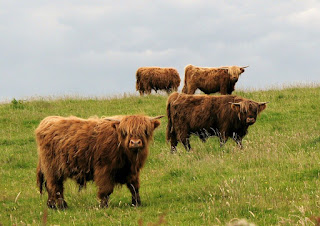Places that are remote (a long way from towns or cities) are sometimes described as the “back of beyond” or “the middle of nowhere.”
Examples:
“It felt as though we were heading to the back of beyond instead of a picturesque village just a few miles from York.”
“Growing up in the back of beyond in Scotland, I have fond memories of eating gooseberries.”
“It’s been four hours since the train stopped in the middle of nowhere, somewhere between Preston and Lancaster.”
“They may have an image of being slightly dour, a bit weather-beaten, stuck in the middle of nowhere and with nothing much to do other than cut peat and count sheep.”
Apparently, “back of beyond” was first used by Sir Walter Scott in 1816 [1].
I was reminded of “back of beyond” while reading Chris Riddell’s graphic novel, Goth Girl and the Ghost of a Mouse - a delightful story with beautiful illustrations - highly recommended.
Photo credit: Michael E. (Creative Commons)
[1] Cresswell, Julia. “back” In The Oxford Dictionary of Word Origins. Oxford University Press, 2009.
I blog about editing, proofreading, and the English language.
Comments and suggestions are welcome.
Many of the phrasal verbs and idioms addressed in this blog were highlighted during an English conversation class I ran a few years ago. I’m grateful to those who attended this for helping me see my native language from a different perspective.
Most of the examples used are quotes from news articles. Click on the links (in yellow) to view the full article.
Saturday 30 November 2019
Saturday 23 November 2019
UNTIL THE COWS COME HOME
The phrase “until (or till) the cows come home” means “for a very long time.”
Examples
“They are happy to run until the cows come home and they are not ones to shy away from the colder temperatures.”
“He said that one can play music until the cows come home, but without visibility, one doesn't get focus from the audience.”
“Whether a college education is essential or not is perhaps something that can be debated till the cows come home.
This phrase apparently dates from the 16th Century [1], when dairy cows were not milked daily but would remain in a pasture for a prolonged time [2]. It is often used to emphasise the futility of doing something for a long time, as in the second and third examples.
Photo credit: ufopilot (Creative Commons)
[1] Cresswell, Julia. “Cow” in The Oxford Dictionary of Word Origins. Oxford University Press, 2009.
[2] “Till” in Brewer's Dictionary of Phrase and Fable, edited by Susie Dent. 19th ed. Chambers Harrap, 2012.
Examples
“They are happy to run until the cows come home and they are not ones to shy away from the colder temperatures.”
“He said that one can play music until the cows come home, but without visibility, one doesn't get focus from the audience.”
“Whether a college education is essential or not is perhaps something that can be debated till the cows come home.
This phrase apparently dates from the 16th Century [1], when dairy cows were not milked daily but would remain in a pasture for a prolonged time [2]. It is often used to emphasise the futility of doing something for a long time, as in the second and third examples.
Photo credit: ufopilot (Creative Commons)
[1] Cresswell, Julia. “Cow” in The Oxford Dictionary of Word Origins. Oxford University Press, 2009.
[2] “Till” in Brewer's Dictionary of Phrase and Fable, edited by Susie Dent. 19th ed. Chambers Harrap, 2012.
Subscribe to:
Posts (Atom)

